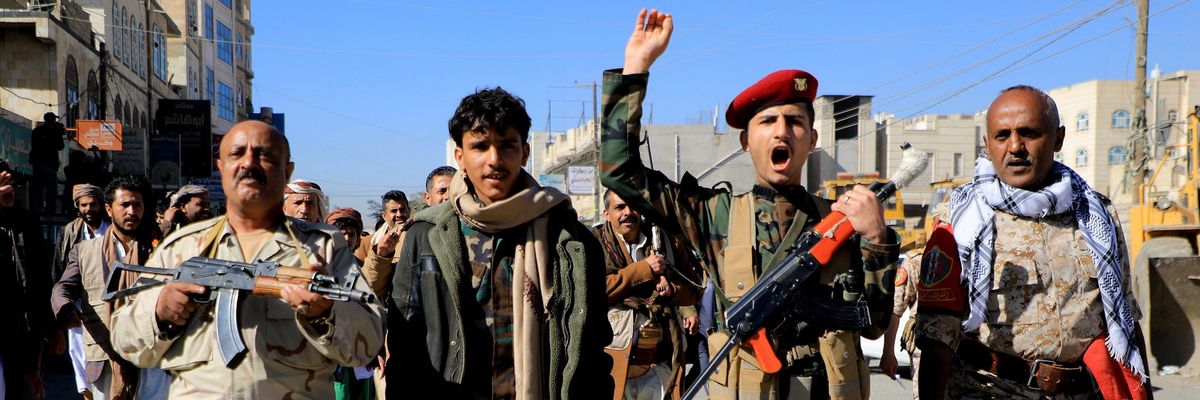As the Houthi militant group in Yemen ramps up its attacks on vessels in the Red Sea—ostensibly in response to what it calls Israel’s “genocidal crimes” in Gaza—the U.S. and U.K. have responded with multiple military strikes in the last week. The U.S. has also re-listed the group as a global terrorist organisation.
The hope is these strikes will pressure the Iran-aligned Houthis to back down. It won’t, however. Short of a complete halt to Israel’s war in Gaza and a 180-degree shift in Western support for Israel’s approach, there is little that will dissuade the Houthis to change course in the foreseeable future.
There are three main reasons for this, none of which are principally about Iran’s regional strategy.
The Group Has Already Survived Years of Airstrikes
The first, and most obvious, reason is the Houthi movement, whose political wing is known as Ansar Allah, has already withstood years of airstrikes in its war with a Saudi-led and Western-backed coalition from 2015-2022.
Prior to this, the Houthis fought six wars against the central Yemeni government from 2004-2010. Guerrilla warfare is not new to them, and harassing ships off their coast does not require sophisticated weapons.
The blockade that accompanied much of the recent war (which is currently in a shaky truce) also helped the Houthis to finetune their weapon smuggling networks from Iran, as well as their own domestic weapon production.
The Houthis have tapped into profound grievances about the West’s policies more generally and its record of reinforcing unpopular regimes in the face of popular action for change.
As a result, airstrikes alone are unlikely to deliver a knockout blow to their military capacity and will almost certainly increase their appetite for a fight.
That is because they can—for the first time—more strongly frame their actions in the context of fighting against the U.S. and Israel, per their slogan: “God is Great, death to America, death to Israel, a curse upon the Jews, victory to Islam.”
With Dissent Rising, the Houthis Have Found ‘Quasi-Legitimacy’
The second reason they are unlikely to be deterred is more important, but less understood, because it is about Yemen’s domestic politics.
The Houthis currently control much of Yemen, including the capital Sana'a, which accounts for around 70% of the population. The people in these regions have been subjected to years of acute and structural violence by the Houthis. This includes:
It is important to note the Saudi-led coalition and internationally recognized Yemeni government have also been accused of committing war crimes and grave human rights violations in Yemen, including the ruthless bombardment of civilians and civilian infrastructure.
At least 150,000 people are estimated to have died violently in the war that began in 2015, though the challenges with collecting such data are considerable. This also does not include the many more thousands that have died from preventable starvation and disease.
The behavior of the Houthis in power has made them deeply unpopular. Dissent is dangerous due to the sophisticated system of repression and neighborhood surveillance the Houthis have imposed in the areas they control. But Yemenis began taking to the street in protest last year anyway in Ibb and the besieged city of Ta’izz.
By centering the defense of Palestinians in their actions, the Houthis have found a way to discredit their domestic opponents—something that has largely eluded them for 20 years.
Then on September 26, just before Hamas’ assault on southern Israel and Israel’s bombardment of Gaza, Yemenis defied the authorities in large numbers.
In protests in the capital city of Sana'a, they celebrated the anniversary of the 1962 revolution that ousted the country’s leader, the Zaydi Imam, Mohammed al-Badr—and with him, the kinship-based autocracy that many Yemenis claim the Houthis seek to reinstate.
Seeing this (rightly) as a demonstration against them, the Houthis were shaken. Amnesty International reported they responded with an “alarming wave of arrests” and “a draconian show of force.”
Against a background of rising dissent at home, the Houthis’ actions and Western retaliation have given the group the gift of “quasi-legitimacy,” according to Yemeni analysts. The U.S.-led strikes also give credence to the Houthis’ demands that critics “shut their mouths.”
And just as important, the U.S. strikes can boost the Houthis’ military recruitment efforts. And this could help them attempt to seize the government-held oil wells in Marib again, which the group needs to become economically sustainable.
Anger Is Rising Against the West Across the Region
The third reason the Houthis are unlikely to be deterred by airstrikes or a terrorist designation is that their actions articulate the wider region’s fury at Israel’s war in Gaza, which has so far claimed the lives of 25,000 Palestinians, and the decades of Western support for Israel’s policies in occupied Gaza and the West Bank.
They have also tapped into profound grievances about the West’s policies more generally and its record of reinforcing unpopular regimes in the face of popular action for change. This includes the selling of weapons and bestowing of political legitimacy to authoritarian regimes in exchange for what the West considers “stability” in the world order.
Yemenis are, however, keenly aware that the Houthis’ rise and expansion was enabled by this same external push for stability, which came at the expense of Yemenis’ ability to determine local solutions to local problems.
By centering the defense of Palestinians in their actions, the Houthis have found a way to discredit their domestic opponents—something that has largely eluded them for 20 years. This will make them even harder to dislodge from power and will likely consign ordinary Yemenis to further violence at their hands.

